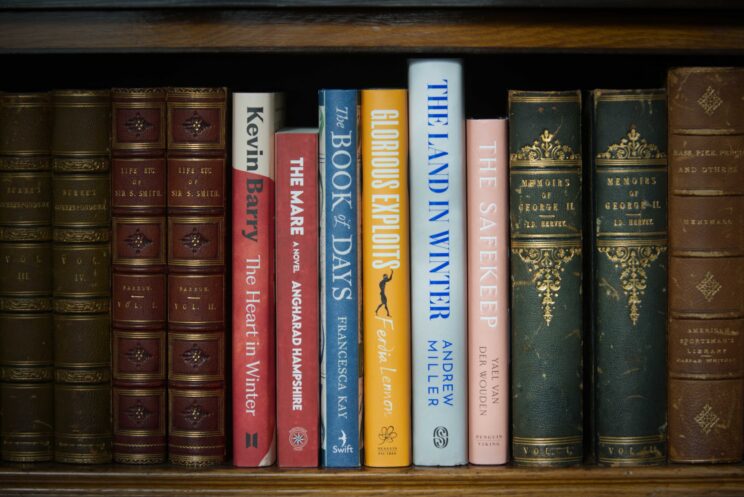The 2025 Shortlist
The Shortlist of six for the 2025 Prize was announced on 15th April – to view the announcement video shot at Abbotsford, click here. Read on to discover what the judges said about each book, and follow our Shortlist Spotlight features for exclusive Q&As with each author here on our website.
The 2025 Walter Scott Prize Shortlist – judges citations
THE HEART IN WINTER Kevin Barry (Canongate)
It’s 1891 in Butte Montana and miners are luring brides out from the east by mail. Tom Rourke, an addict, too soft for the mines, too weak to return to his painful past, stumbles upon Polly Gillespie, another man’s wife. She has “eyes of wren’s-egg blue and one inclined to say hello to the other but not unattractively.” When these two flawed characters meet, an epic love story unfolds. Woven from humour, poetry, emotion and sheer brio, Kevin Barry’s palpable delight in language, in life, in his lovers, sweeps us along on their own wild ride, showing rather than telling how it feels to live wholly, love wholly and wholly surrender to being what one is – at least until fate catches up.
THE MARE Angharad Hampshire (Northodox Press)
Good and evil, truth and lies, remembering and forgetting are themes explored in this harrowing novel. We are introduced to Hermine, a young Austrian woman, working in an idyllic lakeside hotel. There she meets Russell, a former American serviceman. They marry, move to the States and for many years lead a bland and blameless suburban life. But a journalist’s knock forces the couple to face Hermine’s horrific past as a particularly cruel concentration camp commandant. Can love survive such revelations? Is it right or possible to forgive? Do we not all tell ourselves lies to reshape our pasts and make the present bearable?
THE BOOK OF DAYS Francesca Kay (Swift Press)
A quiet book set in unstable times requires particular writerly skills and Francesca Kay displays them in full. Carefully, meticulously, beautifully, she draws us into the entire world of the young wife of a dying husband, his main concern the fate of his immortal soul. Henry VIII, that religious wrecking-ball, is dying, so immortal souls are political as well as personal, and the building of a chantry, evoked by Kay with such skill you can see it, smell it, marvel at it, drives the narrative tension with expert control. But that’s not all. Like a medieval Book of Hours, in her Book of Days Kay intertwines the natural seasons with the liturgical year so the two are braided together like an illuminated manuscript. The Book of Days may be a quiet book, but it shines.
GLORIOUS EXPLOITS Ferdia Lennon (Fig Tree)
The year is 412 BC, and Athens’s invasion of Syracuse has ended disastrously. Thousands of Athenian soldiers are left starving and hopeless in the island’s quarries, doomed to die as prisoners. Enter the parochial Lampo and his melancholy friend Gelon, two local potters with “barely two obols to rub together” and a dream: a performance of Euripides’s Medea staged in their local quarry, with the defeated Athenians as players. Could this be the prisoners’ unlikely form of salvation, or will it only lead to tragedy for all involved? Told in the author’s Dublin accent – which captures the relationship between Syracuse and Athens to great effect – Glorious Exploits is at once witty, bold, heartbreaking and profound. An extreme case of how we can love the art but hate the artist, Ferdia Lennon’s debut novel is an examination of culture in times of conflict, and the perils of human nature.
THE LAND IN WINTER Andrew Miller (Sceptre)
The Great Freeze during the winter of 1962/3 is the setting for this fine book by Andrew Miller. Two couples, hemmed in by the snow in their rural cottages, are put to the test by isolation and the challenges set by the relentless cold. The inner world of each of the four characters is dissected in memorably fine writing with Miller’s characteristic delicacy. The doctor has secrets he is desperate to hide while his wife nurtures her first pregnancy. The farmer pursues an impossible dream for the future of his farm, while his wife huddles by the stove in their freezing cottage, tormented by voices from her past. Like all powerful historical fiction, THE LAND IN WINTER speaks of today as well as of the past. The challenges of isolation are still all too real to us, as lockdown memories remain fresh in our minds.
THE SAFEKEEP Yael van der Wouden (Viking)
Set in rural Holland, fifteen years after the end of WWII, The Safekeep is a novel of historical interiors, both literal and emotional. Its prickly heroine, Isabel, lives a tense, ordered life in her late mother’s house, obsessively guarding the treasured objects within. Into this determined quiet arrives Eva, girlfriend of Isa’s elder brother Louis, to spend a month which feels, to the reluctant hostess, like a lifetime, the pressure of sharing her space, unbearable. Van der Wouden’s exquisite, precise, edgy writing thrums with long supressed, half-understood truths, leading to devastating emotional and sexual discovery. The pantheon of post-war novels is large, but she has found new space and a raw intensity in the seemingly everyday.

